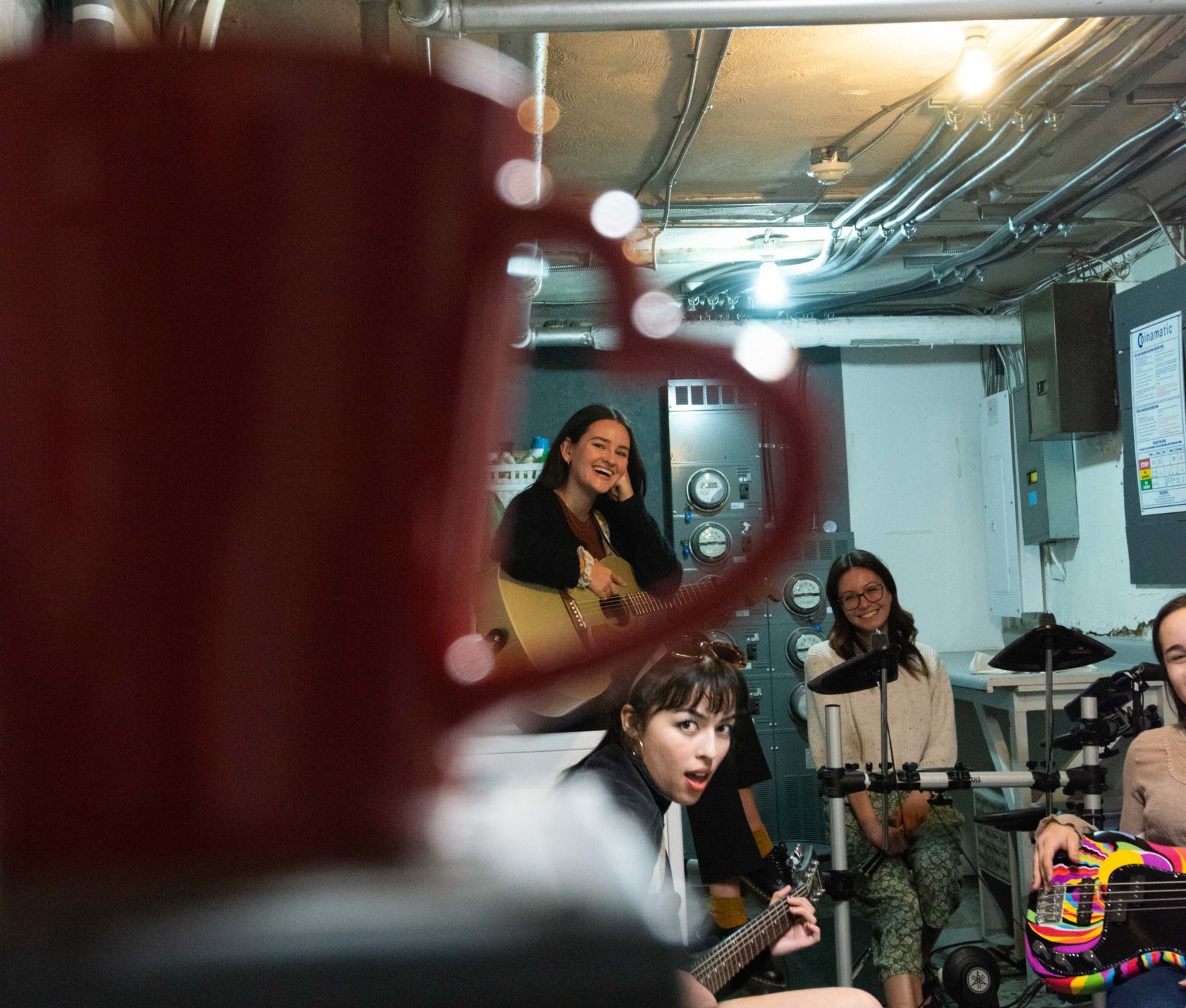by Christopher Hunter
Slow Spirit conjures the sublime: the harmonic markings of jazz, impelled by visceral and frolicking rhythms, morph with punk rock’s defiant fury and a species of poetry that’s, at once, impassioned and spectral. As this sound took shape, the band faced a range of obstacles.
They formed at Brandon University’s School of Music, where Eric Roberts, now Slow Spirit’s guitarist, studied saxophone. At BU, Roberts and a handful of junior-virtuosos dubbed themselves Slow Spirit, and composed an original jazz repertoire. During this period, they played music six to ten hours a day.
“It was a profound part of my life that I wish I could live in forever,” said Roberts. “When we weren’t playing music, we were talking about it and thinking about it.”
Unfortunately, the ensemble dissipated when Julian Beutel, trumpeter, departed for grad school. One year later, Roberts resurrected the project after meeting Natalie Bohrn, bass player, songwriter and now fellow band member.
“It was the integration of Natalie’s songwriting and vocals that gave our ideas focus and purpose,” said Roberts. “It was as if we had been longing to build our songs around a vocalist the whole time.”
The entire band, including drummer Justin Alcook, lived in a loft above a doctor’s office, along with a host of bohemians. Everyday, after 6:00pm, the office closed and the concord (and discord) of rehearsal filled the home. Concerts and recording sessions were common here, and touring musicians stayed often.
“It was the centre of the Brandon music scene for close to a decade,” said Eric Roberts. “We once counted 18 comfortable places to sleep and 29 lamps.”
Tragically, the 29 lamps met their end. Heavy rain damaged the loft and expelled its residents. However, the deluge propelled a welcome excuse to move east and join Winnipeg’s music community, long admired by Slow Spirit.
“In Winnipeg you have to stand for something,” said Bohrn. “You have to make decisions.”
Together, Slow Spirit set up roots in the city, and began playing shows. Outside their main effort, both Bohrn and Roberts back up local talents, including The Crooked Brothers, Fish & Bird and Somebody Language. They also partake in other art forms.
Roberts enjoys photography, and worked in a camera shop before moving. He believes, as cultures intermingle, art grows in unexpected ways. With this in mind, he embraces multiple sounds and artforms, in hopes that they will nourish his creative impulses.
“Terms like musician, photographer or writer carry a lot of weight, preconceptions and, ultimately, responsibility,” he said. “They are untrue ideals that can’t be lived up to.”
Likewise, Bohrn is a writer. In grade 11, the Brandon Sun hired her as a reporter, and she still maintains a love for language and books. Resembling prose, her lyrics evolve as sequential paragraphs, a style comparable to the writing of Ben Gibbard (Death Cab for Cutie and the Postal Service), whom she cites as an influence.
To illustrate Bohrn’s sorcery, consider Slow Spirit’s song “Extension.” Here, she recites a clause or phrase, followed by sparse drumming, then completes or augments the statement with new information. The instrumental space between paragraph segments incites tension and anticipation, as we wait to hear her stories and themes unfold and resolve.
The words themselves often point to baseline emotions and instinctual drives. They are evocative rather than definite. That’s not to say there aren’t stories here, as Bohrn’s prose follows a clear narrative. They simply ignore the arbitrary divisions between form and content. They invite listeners to insert themselves in the music, to follow the sequence, to rise and fall with the performance.
“Lyrics are just poetry. That’s how I think of them,” said Bohrn.
This sound’s final element comes from a punk-rock mentality, an angst driving the post-rock and jazz motifs forward. You hear it as glassy acoustic guitar tones overdrive into a dissonance usually found in hardcore music.
“Jazz is a way for us to understand and engage with all music,” said Roberts. “But there’s something about hardcore and punk that resonate with people in Manitoba. You go to those shows, and you can’t help but feel something.”
Indeed, there’s plenty to feel here. Traditionally, experimental music sought to avoid interpretation by eschewing conventions, but as a result opened itself to a greater range of interpretations, and a greater range of emotional reactions. They understand this notion, and exploit it.
Trust Slow Spirit. Let them ferry you over ethereal landscapes, where the abyss and the divine are the same thing, where the self, in all its contradictory fragments, leaks over space-time in sonic waves.


